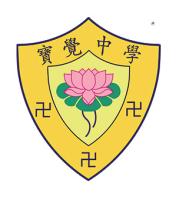| Language Policy |
Bilingual education is adopted in junior secondary. English is used as the medium of instruction on some classes in Mathematics and Science in junior form. The medium of instruction used in senior classes is in contingent on the language ability and the curriculum needs of the students. |
| Learning and Teaching Strategies |
1. Our curriculum aims at cultivating students' self-regulated learning abilities and enhancing their analytical power.<br>2. A wide range of activities is organised so that students can consolidate and apply their knowledge. Activity days are organised every year in which different types of life-wide learning activities can be conducted.<br>3. Our school adopts the ‘Bring Your Own Device’(BYOD) policy with a view to boosting students information literacy and self-regulated learning. |
| School-based curriculum |
1. Electives: 2X and 3X. Students may further take Mathematics (Extended Module 2) and Applied Learning Course.<br> 2. Curriculum highlights: Our school has launched a curriculum reform to keep pace with the latest education developments. We have developed a series of school-based curriculums, including Buddhism and Life, STEAM, Zen Photography and Historical Treasures in Po Kok. |
| Approach to Catering for Learner Diversity |
1. 21 teachers have received training in integrated education. <br>2. Training programmes for "inclusion instructors" and related activities are organized to build a caring environment. |
| Approach to Integrated Education |
To offer full support to special educational needs (SEN) students, the ‘Whole School Approach’ has been adopted. The Student Support Team, including Special Educational Needs Coordinator (SENCO), Special Educational Needs Support Teachers (SENST), School Social Worker, Student Counsellor and Educational Psychologist, organizes regular Individual Education Plans (IEP) and case meetings with teachers, parents and students so as to devise feasible support programmes, teaching adaptations, and assessment arrangements for students with SEN. <br><br>Our school has successfully applied for “The refined School-based Educational Psychology Service”. The Educational Psychologist (EP) will pay regular visits to our school for 30 days, providing case follow-up and intervention services to students and implementing prevention measures at school. At the same time, the Learning Support Fund provided by the EDB not only allows our school to recruit more teaching staff, like teaching assistants, teachers and student counsellors, but also purchase appropriate professional services from other organisations in a view to strengthening the support given to students with SEN in different areas, like curriculum adaptation, learning strategies, peer support and after-school tutorials. Our school is also devoted to cultivating the culture of Integrated Education, boosting students’ learning effectiveness and helping them to respect individual differences as well as integrating them into school life. |
| Education Support for Non-Chinese Speaking (NCS) Students |
|
| Home-School Co-operation |
1. Our school values the contribution of the Parent-Teacher Association. Through home-school cooperation, we expect to exchange views with parents, expand the parent network and collect their opinions for reference in school's development.<br>2. School activities such as the S.1 Parents' Day, S.1 Parents' Night, Parents' Day effectively promote cooperation and communication between parents and the school. Together we work for the well-being of the students and the benefit of the community. |
| School Ethos |
1. We attach great importance to students' moral development. The Wuzi jiaoyu ("Five-self" education), which includes establishing self-esteem, developing students' self-confidence and self-evaluation ability, enhancing self-discipline and self-learning abilities, foster a simple and caring ethos on our campus. This concerted effort is acknowledged by parents and the community.<br>2. The Discipline Committee, Counseling Committee, Moral and Civic Education Committee and the Extra-curricular Activities Committee have organized various leadership training courses and award schemes to promote moral education.<br>3. To promote invitational education, improve students' sense of belonging and confidence. |
| School Development Plan |
Major concerns of the current school year:<br>1. To reinforce students’ self-regulated learning ability and step forward towards SRL 3.0.<br>2. To reinforce Invitational Education and cultivate positive education. |
| Teacher Professional Training and Development |
1. Our school has participated in the Self-regulated Learning Schools Charter organized by The Hong Kong Association of the Heads of Secondary Schools, in order to enhance the effectiveness of teaching.<br>2. To develop a professional learning community actively. Besides regular peer observations and co-planning meetings, open lessons are organized every year so that teachers can share their methodologies with other colleagues from different schools.<br>3. A mentor system is implemented to help new teachers facilitate their teaching and classroom management. |
| Life-wide Learning |
We provide various extra-curricular activities covering four aspects, such as academic activities, sports & art, interests as well as social services, with a view to developing well-rounded students. Each student is required to enroll in one activity related to art, sports and social services. |
